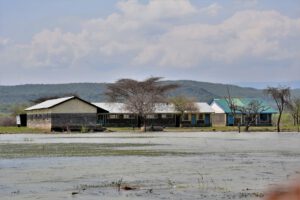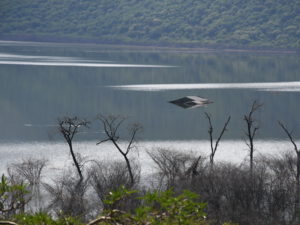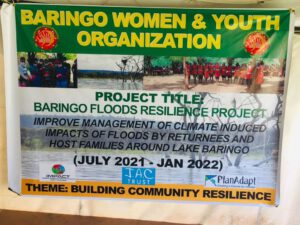Lake Baringo Flood Resilience Project – Improved Management of Climate-Induced Impacts of Floods by Returnees and Host Families
 Communities around Lake Baringo in the Rift Valley of Kenya are increasingly exposed to flooding, contributing to their displacement and loss of livelihoods. The increase of flooding events is caused by catchment degradation, siltation of the lake, erosion of arable land, and an increase in rainfall attributed to climate change. The communities living alongside Lake Baringo are primarily Il Chamus, indigenous fisher-pastoralist communities, who depend on the lake and the land for their livelihoods. Every year, flooding destroys their settlements and public buildings like schools and hospitals, forcing them to relocate, damaging their livelihoods, exacerbating food insecurity, increasing their exposure to water-borne diseases and impacting community dynamics. Of those displaced, the most affected are often women, youth, and the elderly.
Communities around Lake Baringo in the Rift Valley of Kenya are increasingly exposed to flooding, contributing to their displacement and loss of livelihoods. The increase of flooding events is caused by catchment degradation, siltation of the lake, erosion of arable land, and an increase in rainfall attributed to climate change. The communities living alongside Lake Baringo are primarily Il Chamus, indigenous fisher-pastoralist communities, who depend on the lake and the land for their livelihoods. Every year, flooding destroys their settlements and public buildings like schools and hospitals, forcing them to relocate, damaging their livelihoods, exacerbating food insecurity, increasing their exposure to water-borne diseases and impacting community dynamics. Of those displaced, the most affected are often women, youth, and the elderly.
Given this backdrop, the Baringo Youth and Women Organisation (BWYO) is working with the Pastoralists Alliance for Resilience and Adaptation in Northern Rangelands (PARAN) hosted by IMPACT Kenya, and PlanAdapt to improve community flood resilience. The project is funded by JAC Trust, an independent grant-making Trust focusing on climate change and displaced people. In consultation with the most affected communities and individuals, BWYO is leading a project to co-design and co-develop an Integrated Climate Resilience Plan composed of four parts:
- Climate Change Adaptation Plan
- Flood Disaster Risk Reduction Plan
- Ecosystem Management and Restoration Plan
- Livelihood Enhancement Plan
 The participatory co-development of these strategies will take place through a series of workshops, ensuring that they are demand-driven, securing community buy-in and improving the long-term sustainability of the work. Using a ‘training of trainers’ approach, members of BWYO and selected youth and women ‘champions’ will be trained in the topics of flood management, disaster risk reduction, and ecosystem-based adaptation (EbA).
The participatory co-development of these strategies will take place through a series of workshops, ensuring that they are demand-driven, securing community buy-in and improving the long-term sustainability of the work. Using a ‘training of trainers’ approach, members of BWYO and selected youth and women ‘champions’ will be trained in the topics of flood management, disaster risk reduction, and ecosystem-based adaptation (EbA).
While BWYO will implement on the ground activities, IMPACT – PARAN will provide in-country support, financial oversight, and relationship development with other CSOs. PlanAdapt will be supporting the project by sharing knowledge on flood risk management practices (e.g. flood-resilient building design, appropriate crop selection) and offering technical and scientific expertise (climate data and early warning projections). We will also provide backstopping in project design, management and monitoring, and support the co-design of workshops.
By building long-term capacity, the project aims to support communities to manage and reduce their exposure to climate risks, particularly flooding. Households will contribute to a community seed bank used to establish tree nurseries in schools to support livelihoods and protect Lake Baringo’s wetlands. This activity fosters relationships within the communities and promotes intergenerational ownership of the project. Along with this, training and championing women, youth, and the elderly, aims to empower them and reduce their vulnerabilities.
 BWYO estimates that there are 7,500 people in the townships of Ngambo, Rugus, and Salabani who will directly benefit from the project and many more who will indirectly benefit. By securing livelihoods, improving access to clean water, health outcomes, and environmental quality, the project works to improve the quality of life for the community. The benefits are not only socio-economic; better community-led ecosystem management through conservation, restoration, and rehabilitation will protect Lake Baringo’s wetlands.
BWYO estimates that there are 7,500 people in the townships of Ngambo, Rugus, and Salabani who will directly benefit from the project and many more who will indirectly benefit. By securing livelihoods, improving access to clean water, health outcomes, and environmental quality, the project works to improve the quality of life for the community. The benefits are not only socio-economic; better community-led ecosystem management through conservation, restoration, and rehabilitation will protect Lake Baringo’s wetlands.
Finally, we see this project as an initial test to develop sustained and trustful relationships between local (BWYO), national (PARAN and IMPACT) and a decentralised global network-based organisation such as PlanAdapt, also in view of overcoming a supply- and expert-driven model to capacity support. PlanAdapt focuses on working demand-driven upon requests by BWYO and PARAN, instead of delivering expert-driven consulting and advisory services. Furthermore, we hope that the collaboration will lead to long-term organisational sustainability and an enhanced ability to fundraise by BWYO and IMPACT. PlanAdapt supports this by providing links to funding opportunities at international level and sharing intelligence on resource mobilisation.
